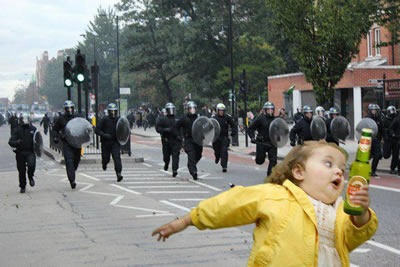Last night my friends from Applied Nonexistence and The Oakland Commune threw a little debate at the Long Haul. I felt implicated.
I participated in the debate on the side of Political Demands, both as a personal test and so that I have my story straight if the syndicalist round ups ever begin. Once I got into it I realized that the “total negation” side of this informal formal debate had a very difficult task ahead of them (other than being the crowd favorite). Not only is proving a negative quite difficult but the negation argument is, at the end of the day, sophisticated. Subtle is hard to do in debate and even harder with a crowd yelling at you.
You can see the results of my debate below. Please laugh. It is supposed to be funny.
Political Demands
Since the format of this debate is messy and unknown even to the participants I am going to assume the best possibly faith from the organizers of the event and argue for an anarchist strategy for the transformation of the world that includes political demands. My questions for the negators will concern the specifically anarchist nature of their position. I will argue that the anarchist understands the state/capitalist composition of the world and that this understanding entails a conflict with it. This conflict requires political demands.
What is strategy
In its simplest formulation a strategy is the design one uses to achieve a goal. I use the term design because unlike a term like process or methodology a design expresses the artistic elements that are necessary for any good strategy. In the case of anarchism the goal is simple: a world without government or massified exchange relationships also called capitalism.
At the heart of any strategy against such a twin enemy, let us call it the spectacle and the fist, must be two components. These components have to blend in such a way to respond to the sophisticated nature of the spectacle while acknowledging that the fist exists and tends towards a linear response.
Analysis of existing conditions and the history of past struggles is a pre-condition to having a strategy today. Without experience, even other peoples, you don’t have enough information to even guess at how to achieve goals. With experience you can begin to establish small goals and through the experience of achieving them set your next goals higher.
As the anarchist goal is the highest of all, the complete emancipation of all those who live under the yoke of the state, the strategy to achieve it is not intuitive. It will be designed through the process of implementing smaller anarchist goals and growing those goals, and as a result strategies, over time.
What is politics
My sense is that much of this debate will hinge on a series of semantic arguments about what exactly negation, politics, complete, and demands are. These debates are a fantastic use of time for scholars and navel gazers but aren’t relevant if we understand that the very definition of being an anarchist is to be in conflict with the existing order and that this conflict is not theoretical.
It is also not simple. The multiplicities of conflict and the terrains conflict should be waged on cannot be simplified into us vs them, black spy vs white spy, good vs evil. The way that we name this sophisticated problem is politics but that doesn’t mean it is the best word for the problem, like many things in the real, existing world, it just happens to be the best term at this time.
A political analysis is the one we use to examine the behavior of the fist, in the form of police violence against black youth, as a foci of struggle. This doesn’t mean that the fist doesn’t serve the needs of much of the property owning citizenry. It does. Our analysis is that the behavior of the fist doesn’t serve the needs of life itself and that the sentiment of power over life is one that will resonate with the non-property owning population we identify with.
What are demands
The framing of the events debate begs the question of my position that is not accurate. It implies that demands are the temper tantrum wails of a petulant child towards their parent. This is ridiculous.
A demand is a request stated clearly and firmly. It isn’t designed to get concessions from those in power but to state the position of those who oppose the spectacle and the fist in terms that are clear.
All-too-often the desires of radicals as stated on posterboard and bumper stickers sound unrealistic. They are not demands but wishes. I wish BART would dismantle their police force. I wish I had a job. I wish the government was nice. Wishes spoken aloud are what liberals do.
A demand is the conscious expression of something unconscious. We want freedom but what does that really mean? A demand is where the unconscious hits the ground running.
What about nothing?
If there is no conflict there is no distinction between the anarchist position and the solipsist one. A solipsist is absorbed with the personal development, interpersonal relationships, and self actualization. These have all been the hallmark of late-stage capitalism. These have all been the benefits that capitalism, in the form of spectacle, have given those who don’t pay attention, or closer attention than giving to charity, to the brutal regime of resource extraction, surveillance culture, and the domination of lifeforms.
Nothing isn’t nothing at all, but an acceptance of the spectacle, the logic of of living live receding into representation. It is not even the silent protest of the conscientious objector or peace activists holding each others hands. Nothing is, at best, the full knowledge of the social relationships of control and pretending that being controlled is a choice.
The velocity of illusions that is hallmark of this society has now created several generations of media saturated ironic do-nothings. There is no harm in their willful irrelevance but they are not engaged in the anarchist project, even if they agree with it or even see themselves being served by its rewards. The anarchist project is conflict with the existing order. It is the strategy of transforming that conflict into the net that drags the spectacle and the fist under water where they will die. Anything else is an interest in philosophy, history, or humanities and is served best in its place.



